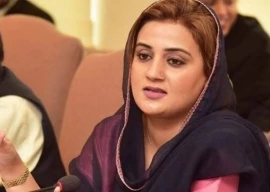
The process to appoint the next chief justice of Pakistan set in motion on Monday immediately after the approval of the 26th Constitutional Amendment by parliament and signed by President Asif Zardari, signalling a rebalancing of authority between the judiciary and the legislature.
National Assembly Speaker Ayaz Sadiq wasted no time in dispatching letters to the Senate chairman and parliamentary leaders of different parties, requesting nominations for a special committee that will finalise the next head of the Supreme Court, as per the latest constitutional amendment.
Through the letter, the speaker drew attention toward the newly-inserted Article 175A of the Constitution, whereby the chief justice would be nominated by the Special Parliamentary Committee from a list of three most senior judges of the Supreme Court.
Under Clause 3A of the article, the 12-member committee will be consisted of eight members from the National Assembly and four from Senate, while the members would maintain a proportional representation based on the strength of the treasury and the opposition in parliament.
The timing of the move as well as the speed was not lost on observers. The 26th Amendment was passed when the Fajr Azan echoed across the capital in the wee hours of Monday. Within minutes Prime Minister Shehbaz Sharif signed the bill and sent it to the president.
Within the next few hours, President Asif Ali Zardari signed it to give the presidential assent and it became a part of the Constitution. Subsequently, the speaker sought names for the committee and by Monday evening, the names had emerged.
In response to Speaker's letter, Senate Chairman Yousuf Raza Gilani stated that the names received from the parliamentary party leaders in the upper house included PPPP's Senator Farooq Hamid Naek, PML-N's Senator Azam Nazeer Tarar, PTI's Senator Syed Ali Zafar and JUI-F's Senator Kamran Murtaza.From the National Assembly, PML-N nominated Khawaja Asif, Ahsan Iqbal, and Shaista Pervaiz; PPP nominated Raja Pervaiz Ashraf and Naveed Qamar; PTI's nominees included Barrister Gohar and Sahibzada Hamid Raza; while MQM chose Rana Ansar for the special committee.
The National Assembly Secretariat not only issued the letter regarding formation of the committee but also conveyed that the committee would hold its first in-camera meeting on Tuesday, October 22 (today) at 4pm at Parliament House.
As per the 26th Amendment, the special parliamentary committee's task is to vet the top three senior judges. Once the name is finalised, it will be sent to the prime minister, who would then forward it to the president for the appointment.
The new process signals a significant departure from the judiciary's long-held autonomy in determining its own leadership. Before the 26th Amendment, the senior most judge of the Supreme Court used to take the office the chief justice.
Apparently being tired of judicial overreach, this is the first time the parliament is curtailing the judiciary's influence in political and governance mattersa power the courts have exercised expansively in recent years.
Currently, the focus is on the next chief justice's selection and the committee would determines who among the three most senior judges will ascend to the highest judicial office in the country but the focus will soon shift towards establishing constitutional benches in the apex court and five high courts.
Both the changes carry immense political impact as well as highlight a larger pattern of political influence over judicial appointments. The ruling alliance was seen vocal against court rulings, especially following several rulings that clashed with the government's agenda, including the matter of reserved seats in national and provincial assemblies.
Since July 12, the matter is hanging in balance as a majority of the full court bench had ruled that the PTI was not only a parliamentary party but eligible for reserved seats that were earlier distributed among other ruling and opposition parties.
On one hand, the majority ruling declared that the PTI was eligible for seats reserved for women and minorities and that the ECP failed to perform its due role in the general elections of 2024, while on the other, the speaker emphasised that a recent amendments to the Elections Act must be applied when the ECP allocated these contested seats.
The nominations and subsequent formation of the parliamentary committee is the beginning of what is likely to be a closely watched as many have keen interests in the outcome. Subsequently, all eyes would be on who makes it to the constitutional bench.
Amid all this, the legal fraternity is preparing for a showdown as many within the legal community view these changes as an attempt to undermine the judiciary's independence, setting the stage for a potential new wave of protests reminiscent of the Lawyers' Movement of 2007.


1725612926-0/Tribune-Pic-(8)1725612926-0-165x106.webp)















COMMENTS
Comments are moderated and generally will be posted if they are on-topic and not abusive.
For more information, please see our Comments FAQ